County Council Approves Seven Charter Changes (Amendments) to be placed on Ballot.
Alfredo G. Evangelista
Assistant Editor
For most Filipinos who tune in to Philippine politics, Cha-Cha is not only a dance but an abbreviation for charter change.
Here on Maui, voters must decide in the upcoming general election on November 3 whether to vote for the Cha-Cha. Seven charter changes or amendments have been approved by the County Council and will be on the ballot.
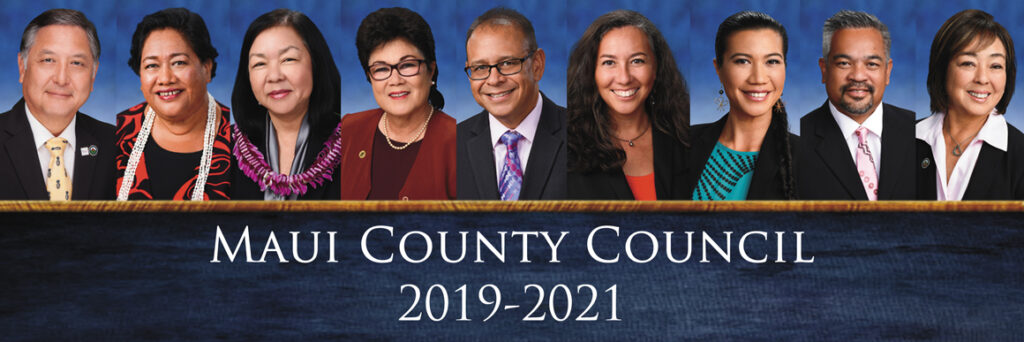
Just in case you’re into the political science stuff, there are four ways to get a change on the ballot: (1) by resolution of the council that is passed by a vote of six or more members; (2) by a petition presented to the council (signed by not less than 10% of the registered voters in the last general election) and passed by a vote of five or more Council members; (3) by a petition to the County clerk (signed by not less than 20% of the registered voters in the last general election); [Section 14-1 of the County Charter] or (4) by the Charter Commission which meets every ten years and has to submit the proposed changes to the County Clerk within 16 months after their appointment [Section 14-3 of the County Charter].
The County Charter is the equivalent of Maui’s constitution and like the United States constitution and the Hawaii constitution, the preamble to Maui’s charter begins with the words “We the people…” The preamble to Maui’s Charter explains why the Charter is adopted: “In order to secure the benefits of the best possible form of county government and to exercise the powers and assume the responsibilities of county government to the fullest extent possible…”
The seven charter amendments deal with a variety of topics:
1. increasing the affordable housing fund;
2. giving an unelected Managing Director the powers of the elected Mayor;
3. clarification of term limits for the Council;
4. creating standards for the interpretation of the Charter;
5. giving power to the Council to appoint members of the Charter commission;
6. clarification of term limits for the Mayor; and
7. creation of a new County Department of Agriculture.
Yup, some of these charter amendments seem esoteric in nature and maybe only lawyers and political scientists get excited about them. But there are a few charter amendments that some say can affect Maui’s Filipino community and its political access.

Photo courtesy Ceasar Lizada
Affordable Housing Fund (Resolution 20-59; passed the Council on a 6–3 vote with Hokama, Kama, and Sugimura voting no.)
Shall the Charter be amended to require that a minimum percentage of the certified real property tax revenues be appropriated into an affordable housing fund beyond Fiscal Year 2021, to be used for the provision, protection, and expansion of affordable housing and suitable living environments; and to increase the minimum required percentage from 2 percent to 3 percent of the certified real property tax revenues, effective July 1, 2021?
According to May Anne A. Alibin, the Deputy Director of the Department of Finance, for fiscal year 2021 (July 1 2020–June 30 2021) the certified real property tax revenues was $375.9 million (net of circuit breaker adjustment) and 1 percent of that equals $3.8 million.
Chris Sugidono, Assistant Communications Director for the Office of the Mayor, said the Affordable Housing Fund estimated balance as of June 30, 2020 was $26.3 million. Five projects were awarded funding for a total of approximately $13.7 million in FY 2020.
For the voters, the question is where would the budget be reduced by almost $4 million dollars if this Charter amendment was passed? Would it come from the Office of Economic Development? Would it come from the Parks Department? Would it come from the Housing and Human Concerns Department?
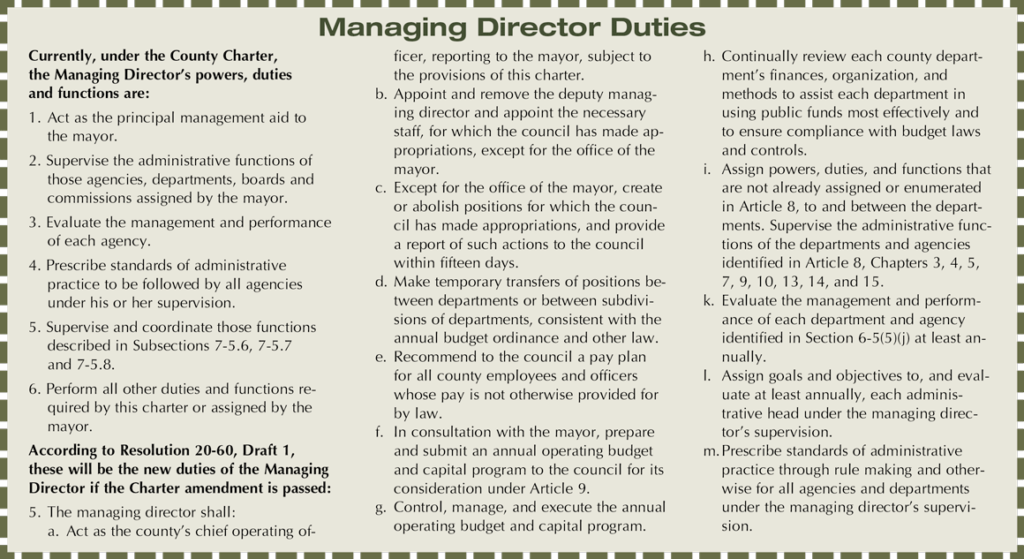
Office of the Managing Director (Resolution 20-60; passed the Council on a 6–3 vote with Hokama, Kama, and Sugimura voting no.)
Shall the Charter be amended, effective January 2, 2023, to reorganize the executive branch for the County of Maui to establish an Office of the Managing Director, wherein a Managing Director, hired by the Mayor through a recruitment and selection process involving the Mayor, Council Chair, and a three-member citizen group, shall function as the County’s chief operating officer responsible for the County’s daily operations, the appointment and removal of most department heads, and the implementation of County policy; the Mayor shall be the County’s chief executive officer responsible for supervising the managing director’s work, representing the County in intergovernmental affairs, having the authority to approve or veto bills, nominating board and commission members, and enforcing provisions of the Charter, County ordinances, and all applicable laws; and authorizing various housekeeping revisions?
Currently, there is a Department of Management with a Managing Director appointed by the Mayor, with the approval of the council. The Managing Director is required to have at least five years of experience in an administrative capacity. The Managing Director’s duties are to supervise agencies, departments, boards and commissions assigned by the Mayor. The Mayor appoints most of the department heads. [See “Managing Director Duties” sidebar for a comparison of the current duties versus the proposed duties.]
This Charter amendment is expected to garner the most interest. Two years ago, a similar amendment for a County Manager was proposed to the Council but was rejected and not included on the ballot.
Proponents of this Charter amendment believe this is long overdue. “First, in general, everyone benefits from good government,” said Mark Hyde who has shepherded this Charter amendment. “I define good local government as one free from cronyism; that puts the interests of the people before politics; that places the best, most experienced and qualified people in management positions given the work to be done; that is accountable for performance; and is transparent. Effective local government has community-centered policies and plans in place and follows and implants them efficiently and effectively.”
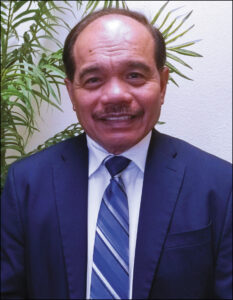
Photo courtesy Benjamin Acob
Benjamin Acob, who was appointed as Prosecuting Attorney by Mayor Charmaine Tavares, said “Yes if professionally educated and/or experienced in managing counties and/or cities and belong to an organization (International County/City Management Association) where he or she could get continuing education and that subscribes to a code of ethics which among other things, require him or her to: a) be non-partisan and non-political and b) demonstrate by word and action the highest standards of ethical conduct and integrity in all public, professional, and personal relationships.” But Acob noted “The language of the Charter Amendment on the ballot presents many questions. Who appoints the three citizens partly responsible for hiring? The Mayor? If so, it does not sound so non-political or nonpartisan. How much supervision by the Mayor? To the point that the manager works in the best interest of the Mayor and not the public? If for the Mayor, does not sound so non-political or nonpartisan. The way the language of the Charter Amendment is worded, I will vote NO.”
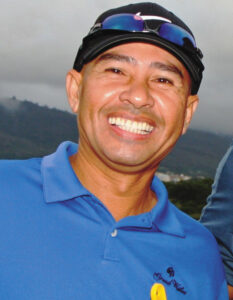
Photo: Basilia Evangelista
“Looking at it and trying to understand the whole concept, it’s a little difficult. There’s good and bad,” said Arnel Alvarez, who is currently laid off from his job in the hotel industry and is a part-time radio announcer. “Good so the Mayor can concentrate on other things with the Managing Director at the Mayor’s side. But under the proposed change, the Managing Director is sharing the power with the Mayor. With the Managing Director sharing power with the Mayor, it’s seems a bit lopsided. The way I look at it, there’s nothing wrong with the old system. If we go through with the Managing Director sharing powers with the Mayor, that would give the Managing Director too much power because the Managing Director was not elected.”
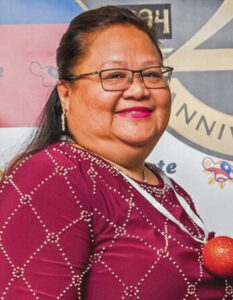
Photo: Ceasar Lizada
Melen Agcolicol, a small business owner and a Filipino community leader agrees with Alvarez: “I disagree with reorganizing the executive branch for the County of Maui to establish an Office of the Managing Director. It doesn’t make sense to have this position because that is the job of the Mayor. It seems to me that the Managing Director has more power than the Mayor. I think it will create a conflict in the long run and also cost us more money to hire staff to support the position. Leave it the way it is. We only need one Mayor!”

Photo courtesy Nora Cabanilla-Takushi
Agcolicol’s sentiments were echoed by Nora Cabanilla-Takushi, an educator and Filipino community leader. “I want the Mayor to be the Mayor. That’s why we voted for the Mayor. I think the Mayor should be able to lead us or guide us to a better solution to everything we need. With the reassignment of duties from the Mayor to the Managing Director, why even elect a Mayor?”
Agcolicol noted how the Filipino community would lose its political clout. “For the Filipino community, it reduces our effectiveness in the political process. In close elections, we have made the difference. For example, in 1998, Kimo Apana became Mayor by less than 2,500 votes. In 2002, Kimo Apana lost his re-election bid by less than 1,200 votes to Alan Arakawa. In 2006, Alan Arakawa lost his re-election bid by less than 1,800 votes to Charmaine Tavares.”
Cabanilla-Takushi agrees. “We won’t get the full benefit of support because we need to go through an unelected Managing Director instead of a Mayor that the Filipino community helped to elect so our Filipino community will suffer and lose any political clout.”
Cabanilla-Takushi was also concerned about whether the proposed charter amendment would mean hiring from the mainland. “If we’re hiring people from the outside who don’t know a lot about our culture, it will be difficult to get support for our various Filipino community activities–and we have many. It would take awhile for a newcomer to adjust to our multi-ethnic society and to learn about the strengths of each cultural group.”
Alavrez was equally concerned. “It is good to out-source it but shouldn’t we focus on who is eligible in the County first? If we bring folks in, it will be difficult because it’s hard for them to adjust. If they’re from the County, they have more knowledge about the County of Maui and its people.”
Agcolicol was doubtful support of the Filipino community’s activities would continue. “The elected Mayor understands our community because it’s important to gain our votes. A non-elected official does not need to understand our Filipino community and will probably come from the mainland. How in the world will someone fresh from the mainland understand the Filipino community and know the different regions of our ancestry? Would this person be sympathetic to our various events like the Barrio Fiesta, Rizal Day celebration, Miss Maui Filipina, Maui Fil-Am Heritage Festival, and support our community projects like the Bahay Kubo renovation? I highly doubt it.”

Photo courtesy Mark Hyde
When asked how this Charter amendment would affect Maui’s Filipino community, Hyde replied: “I look to quality of place, which is largely the result of County policies and implementation. Based on County demographic data, many Filipinos reside in Central Maui, Kahului in particular. I don’t see the community developing as planned and it shows to the detriment of residents. As an aside, despite Kahului’s large population it is without a community association to watch out for the interests of residents so it is particularly vulnerable to local government inattention and failure to implement policies and plan. By the way, the Kahului-Wailuku Community Plan is eight years behind the ordinance-required update cycle of every 10 years: it was adopted by the Council in 2002. This in itself is not unique because Maui County government is not abiding by County law which calls for community plan updates every 10 years. Except for those community plans which have recently been updated (Lana‘i and Molokai) all our community plans are way beyond required updating – most over 10 years tardy. The effect of this is that our become stale. More importantly, they are often simply ignored by the County executive branch to the detriment of all residents.”
Hyde specifically pointed to urban sprawl in Kahului. “Let me get more specific. Urban sprawl is rampant in Kahului due primarily to the expansion of commercial enterprises such as Walmart, HomeDepot, Target, Lowes, Ulta Beauty, PetCo , Safeway and the like in the industrial area along Hoʻokele. The effect of this, which is classic urban sprawl, is to rob Kahului of a vibrant town center and community and deprives residents or what should be a walkable, bike-able, enjoyable, nearby downtown. Instead, because all these new commercial enterprises have been allowed to develop outside the core, residents must drive to these stores as older stores in the core withers. Safeway has abandoned what should be the downtown to perch stores along Hāna Highway and Ka‘ahuumanu Avenue. Queen Ka‘ahumanu shopping center is rife with vacancies and appears to be holding on by a thread. It shouldn’t be this way. But without a County government implementing the community plan and abiding by clearly written policies rejecting urban sprawl, Kahului’s former downtown is in rapidly decline to the point of blight. This is not acceptable. This need not be the case. Professional managers know how to implement policies, the doing of which leads to better quality communities.”
Term Limits for Council Members (Resolution 20-98; passed the Council on a 6-3 vote with Hokama, Kama, and Sugimura voting no.)
Shall the Charter be amended to establish stricter term limits for Council members by limiting the number of terms a person may serve as a Council member to five full terms?
Currently, the number of terms a person may serve as a Council member is no more than five consecutive full terms of office.
The 1991–1992 Charter Commission Report to the County Council stated “The commission found merit in the recommendation that a limitation be placed on the number of consecutive terms that a council member can serve.” The Commission also explained “Under the recommended change, a council member would be prohibited from running for a council seat after five consecutive terms but could run again after the lapse of at least one term.”
Three current Council members have served more than a total of five two-year terms. Council member Riki Hokama was first elected to the Council in 1998 and served five two-year terms to 2008, took a break and returned in 2010 and will serve five two-year terms to 2020. Council member Michael Molina was first elected to the Council in 2010 and served five consecutive two-year terms. He took a break and was again elected in 2018 and is seeking re-election. Council Chair Alice Lee was first elected to the Council in 1988 and served until 1998; she was elected in 2018 and is unopposed in 2020.
According to the Resolution “any terms of office served prior to the effective date of this amendment will not be counted toward the term limits … ” so the current council members are “grandfathered” in.
For Maui’s Filipino community, the question is does this increase the opportunity for political participation and election? Although Filipinos and part-Filipinos represent almost 30% of the population, for the last sixty-four years, there have been only ten Council members who are of Filipino ancestry (with four of them serving one two-year term) sitting on the nine-member Council:
Richard Caldito Sr. (1956–1972)
Rick Medina (1976–1984; 1988–1994)
Mariano Acoba (1978–1980)
Vince Bagoyo (1990–1992)
John Enriques (1998–2000)
Joseph Pontanilla (2002–2012)
Danny Mateo (2002–2012)
Don Guzman (2010–2018)
Alika Atay (2016–2018)
Keani Rawlins-Fernandez (2018-present)
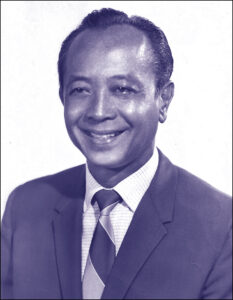
Photo courtesy Caldito ‘Ohana
In January 1991, Tata Richard Caldito was interviewed by Warren Nishimoto and Daniel W. Tuttle, Jr. for an oral history project at the University of Hawaii. In his interview, Caldito talked about his life, including his political history as being the first Filipino elected as a County official in 1956: “At that time, well, I think when I first ran, probably, we [Maui County] had about 700 or thereabout. But, as you said, at that time in ‘60, ‘62, we increase in great number because a lot of Filipinos were seeking citizenship, you see. But they did not make use of their rights because many of them did not become American citizen yet …. ”
Caldito explained why he ran for office. “Yes, I had a pretty good life, as far as politics goes because, I wanted to pave the way for the young people and, goddarn it, I waited quite some time …. One election, I think, on my fifth term-I said, ‘My goodness, please vote for me because we are still waiting for the graduates to come back.’ Son-of-a-gun, lot of people voted for me (chuckles). Because, they wanted to probably—‘This voice representing labor, let’s go out for him’ and … this Filipino youth who goes to college, come back, and represent them. And after that, we had quite a bit of graduates coming back but some of them did not take an interest in politics, at that time yet.”
Caldito hoped for more representation of Filipinos on the County Council: “And, I think if we have more Filipino youth qualified, run for office, probably could even have three or four …. I think the voting public is different, really different now than before. Before, see, if you are a Japanese candidate, and you qualified, you get all the chance to be elected. But now it seems as though that we get lot of haole voters, we got lot of Filipinos. And Japanese, we have lot of Japanese, too, but it seems as though the other groups is catching up. So, I think qualifications is one of the key now-the way I look at it … ”
Does the current system of allowing a break to return to elective office provide more opportunities? Cabanilla-Takushi doesn’t think so. “I think the current system of five consecutive terms and then allowing a break only to return back to office is too long. We need to give others an opportunity to lead us and we need to give the younger generation an opportunity to serve.”
Standards for Charter Interpretation (Resolution 20-99; passed the Council on a 7-2 vote with Hokama and Sugimura voting no.)
Shall the Charter be amended, effective January 2, 2021, to establish standards for interpreting and complying with the Charter, including by requiring a viable judicial action to be filed within 30 days to seek clarity when a conflict in the interpretation of the Charter is identified?
If this Charter Amendment is adopted, Section 15-1 would be amended to include the following language:
g. If a question in interpretation is the source of a conflict between the administration and the county council, then the corporation counsel or special counsel, if any, must seek a declaratory judgment, a writ of quo warranto, or other appropriate judicial remedy on the county’s behalf within thirty days of the conflict being identified to obtain clarity in the interpretation of this charter’s provisions, unless another party has already brought a viable judicial action for the same purpose.
h. A willful violation of a charter provision by an elected or appointed county officer or employee constitutes use of county property or personnel for other than public activity or purpose under Article 10 and, therefore, is grounds for the commencement of impeachment proceedings. A willful violation of a charter provision by an employee is grounds for discipline including termination of employment.
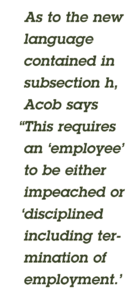 Acob would vote No on this charter amendment. With respect to the new language contained in subsection g, Acob notes “Special counsel should be automatically appointed because the dispute is between two entities that the corporation counsel serves.” As to the new language contained in subsection h, Acob says “This requires an ‘employee’ to be either impeached or ‘disciplined including termination of employment.’ This different treatment of the same person is already a problem. And this provision does not state who is going to commence impeachment. According to the Charter, there is a procedure for a recall (Article 12) which I believe is what is meant by impeachment. With the finding by a court of law that there is a violation by the official, would not the Council initiate the impeachment process because that would only make sense? Then say so. If something else, then say so.”
Acob would vote No on this charter amendment. With respect to the new language contained in subsection g, Acob notes “Special counsel should be automatically appointed because the dispute is between two entities that the corporation counsel serves.” As to the new language contained in subsection h, Acob says “This requires an ‘employee’ to be either impeached or ‘disciplined including termination of employment.’ This different treatment of the same person is already a problem. And this provision does not state who is going to commence impeachment. According to the Charter, there is a procedure for a recall (Article 12) which I believe is what is meant by impeachment. With the finding by a court of law that there is a violation by the official, would not the Council initiate the impeachment process because that would only make sense? Then say so. If something else, then say so.”
Acob argues “It is noted that the attempt to ‘impeach’ someone who has violated the charter is laughable because it will never happen under the procedures given by the Charter and the reality of the voting population. The recall procedures, Article 12, Section 12-6, requires: ‘If less than fifty percent (50%) of the voters registered in the last general election shall vote at such recall election, the officer sought to be recalled shall not be deemed recalled regardless of the outcome of the election.’ As of the last general election, only approximately 36% of the registered voters voted, way less than the required 50% if impeachment should need to happen. Article 12 itself should be amended to give it a chance to do what it is intended to do unless the voting population increases to over 50% to at least get to the threshold, which likely will not happen.”
Acob states “If this proposed amendment is to ‘fix’ the situation where the Mayor and the Council specifically disagreed on the reappointment of a department head that has been rejected by the Council, the City and County of Honolulu has an answer to that and should be considered. Section 4-104 of the Revised Charter of the City and County of Honolulu 1973 (2017 Edition) states: ‘If the nominee fails to be confirmed by the council, the nominee shall not be eligible for another interim appointment to the same office.’”
Acob believes that perhaps the Charter review process should be more frequent than every ten years: “The Maui County Charter in Section 14-3 provides a mandatory review every ten years with the use of a Charter Commission. It should be reviewed more frequent than that, perhaps every four years for any proposed revisions to be placed on the ballot during mayoral election year. The Charter should be reviewed for internal consistency, current applicability of provisions, to review the proper functionality of provisions such as the Recall provision mentioned above, and whether it should provide more clear, descriptive and thorough procedures including but not limited to the appointment of Department Heads.”
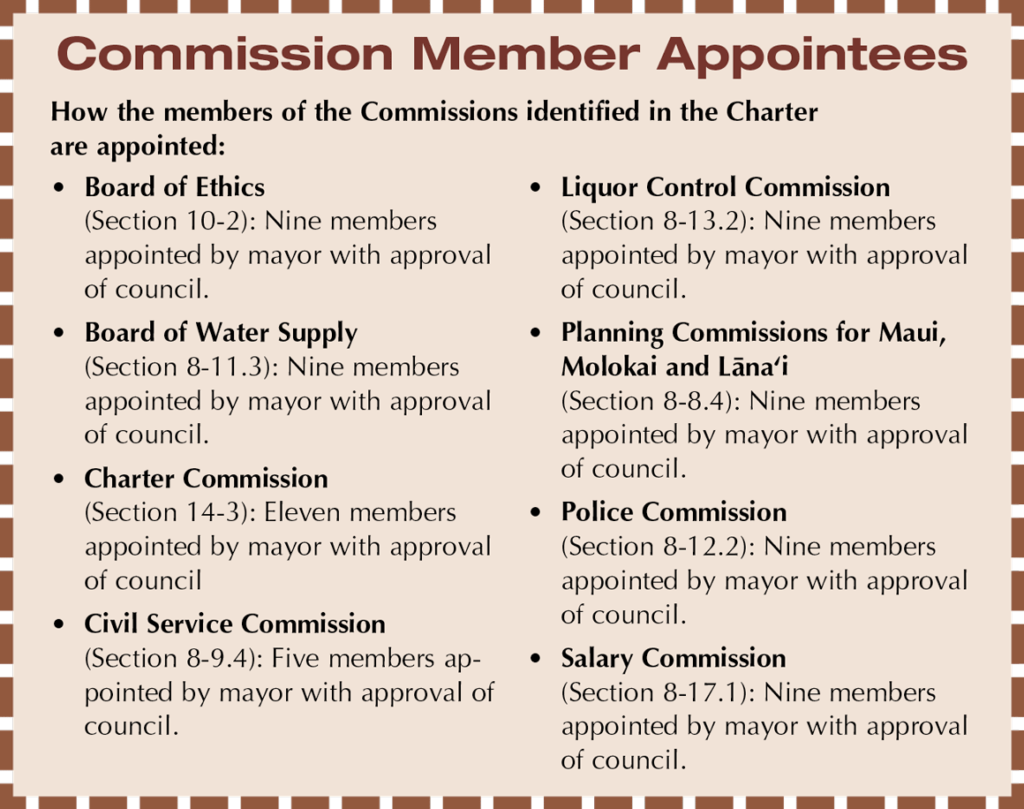
Charter Commission (Resolution 20-100; passed the Council on a 7–2 vote with Hokama and Sugimura voting no.)
Shall the Charter be amended, effective January 2, 2021, to authorize the Council to appoint nine members and the Mayor to appoint two members of the 11-member Charter Commission, which is required to study and review the operation of the County government?
Currently, the Mayor appoints all eleven members of the Charter Commission, with the approval of the Council.
See the box below to compare how all the members of the commissions identified in the Charter are appointed.
With the current system of the Mayor appointing the members and the Council approving them, there is checks and balances. But with the proposed Charter amendment, who will “check and balance” the Council’s nine appointments?
Term Limits for Mayor (Resolution 20-101; passed the Council on a 7–2 vote with Hokama and Sugimura voting no.)
Shall the Charter be amended to establish stricter term limits for the Mayor by limiting the number of terms a person may serve as Mayor to two full terms?
Currently, a mayor shall not serve more than two consecutive full terms of office.
If this charter amendment was in effect in 2014, Mayor Alan Arakawa would not have been entitled to run for re-election as he was first elected for a four year term in 2002 (defeating incumbent James “Kimo” Apana). Arakawa lost his re-election bid in 2006, losing to Councilwoman Charmaine Tavares (daughter of former Mayor Hannibal Tavares). In 2010, Arakawa beat the incumbent Tavares and in 2014, won re-election, serving a third term.
Cabanilla-Takushi believes the word “consecutive” should be removed from the Charter. “Like the Council races, it should not be limited to consecutive terms.”
Department of Agriculture (Resolution 20-102; passed the Council on a 6–3 vote with Hokama, Kama and Sugimura voting no.)
Shall the Charter be amended, effective July 1, 2022, to establish a Department of Agriculture to develop a sustainable regional agricultural system for Maui County?
Currently, there is no Department of Agriculture in the County.
If passed, the Charter will have a new section which will include the following language:
The primary purpose and intent of the creation of the department of agriculture is to provide advocacy, and not create additional regulatory barriers, on all matters related to agriculture. The director of agriculture must:
1. Develop a sustainable regional agricultural system for Maui County.
2. Build the economic resiliency of the county’s communities by increasing opportunities in the agricultural sector.
3. Boost resident health and food security through ensuring access to locally grown agricultural products.
4. Promote healthy ecosystems through natural resource regeneration and protection, including through advising other agencies and the council on all programs and projects that affect the agricultural section.
5. Develop and implement programs to diversify and expand sustainable forms of agriculture.
6. Report to the mayor and council annually on the County’s overall performance in meeting agriculture objectives and any barriers that could be addressed by ordinance.
7. Perform other duties and functions as assigned by the mayor or managing director.

Photo courtesy Robert Mata
When asked about the Charter amendment establishing a County Department of Agriculture, Robert Mata, owner of Oby’s Farm LLC said “I haven’t really heard about that charter amendment. To me, that is really, really great. We need farmers on Maui.” Mata farms 155 acres and grows sweet potatoes, cucumbers, okra, long beans, asparagus and cherry tomatoes. Mata says “The biggest help I need is workers who are able to work on the farm. What I’ve noticed is that locals on Maui don’t want to work on the farm except for the Nanas and Tatas. I want the government to emphasize buying more local produce and support local farmers. Even though it’s cheaper at Costco, how can the local farmers survive? We cannot bring down the price because the fertilizer companies don’t bring down the price. Every year it goes up.”

Photo: Alfredo Evangelista
Angelo Mariano has a dragon fruit farm–3.8 acres and he is looking to expand. His focus is on the day to day struggles of being a farmer. “The green waste is about to close by the end of this month. What would I use for soil for my plants?” Mariano also discusses another problem he faces. “I’m paying my taxes but plenty growers are growing in their back yards, selling in the stores at low prices, without paying taxes.” Mariano believes the County government is not helping. Like Mata, Mariano is is need of workers: “There is only a six month fruit season but I need manpower to maintain the land. I need capital to pay for the labor.” Mariano has not applied for any grants because he admits he doesn’t know how to write for grants. Mariano says he never heard about the proposed Charter amendment and says “there’s no details” how a Department of Agriculture would work.
One of the unknown details is the cost of a new County Department of Agriculture. By way of comparison, the administrative costs for the Department of Transportation, the newest department that was created in 2002 as a result of a charter amendment, is over $700,000 each year. (The program costs include over $7 million to run the bus system and over $600,000 to run the air ambulance program.) These costs come from the general fund and are paid through real property taxes.
While these seven proposed amendments can seem to be overwhelming, in the end, they all change Maui’s current government in significant ways, shaping how public services will be delivered or accessed. Filipinos need to consider how these amendments, if adopted, impact or prejudice our community interests and needs.
When voting YES or NO on these Charter amendments, consider the words of our Charter’s preamble and ask yourself does this proposed charter amendment help in creating the “best possible form of county government”?
Once you’ve answered that question, you’re ready to do the Cha-Cha.
 Alfredo G. Evangelista is a graduate of Maui High School (1976), the University of Southern California (B.A. Political Science 1980), and the University of California at Los Angeles School of Law (1983). He is a sole practitioner at Law Offices of Alfredo Evangelista, A Limited Liability Law Company, concentrating in estate planning, business start-up and consultation, nonprofit corporations, and litigation. He has been practicing law for 36 years (since 1983) and returned home in 2010 to be with his family and to marry his high school sweetheart, the former Basilia Tumacder Idica.
Alfredo G. Evangelista is a graduate of Maui High School (1976), the University of Southern California (B.A. Political Science 1980), and the University of California at Los Angeles School of Law (1983). He is a sole practitioner at Law Offices of Alfredo Evangelista, A Limited Liability Law Company, concentrating in estate planning, business start-up and consultation, nonprofit corporations, and litigation. He has been practicing law for 36 years (since 1983) and returned home in 2010 to be with his family and to marry his high school sweetheart, the former Basilia Tumacder Idica.
